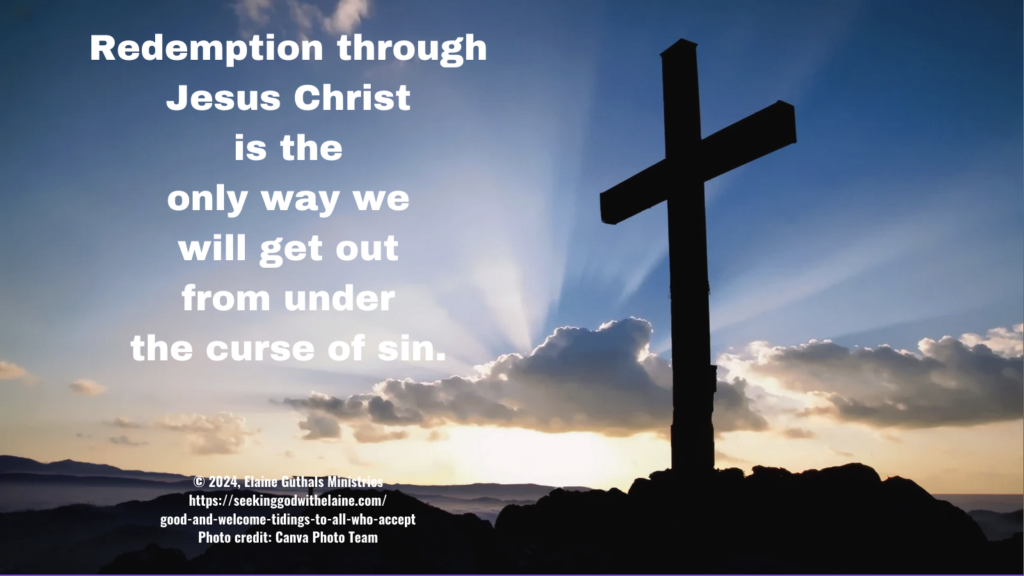When we think about Christ on the cross, we think about the good news that His story proclaims. This devotional reading begins to look at explaining the good news of the gospel and showing why it is offered to all.
Nuggets
- Jesus is Christ of the Cross so that the unregenerated world could be restored from the curse of sin.
- Through Jesus, we have all we need in the gospel message – forgiveness and justification.
- There are many benefits that we gain from the gospel, likening them to a scrumptious feast.

We are members of the unregenerated world until we accept Jesus as our Lord and Savior. He became our Savior when He accomplished the Plan of Salvation. In these devotions leading up to Easter Sunday, we are going to look at what all that entails.
We will be looking at Boston’s sermon, Jesus and the Meek. We are going to skip the discussion on meekness for this series. We’ve covered that several times before. We’re going to jump in on the good tidings of the gospel.
We will start out by looking at how the gospel tidings for the meek. They tell us of a complete salvation.
Let's Put It into Context
To read devotions in the On the Day of the Lord theme, click the button below.
Devotions in the Gospsel Tidings about Easter series
The foundation of this series is Boston’s sermon, Jesus and the Meek.
Resource
The headings are Boston’s words.
These Tidings Relate to a Redemption, to a Ransom Paid
“Christ redeemed us from the curse of the law by becoming a curse for us—for it is written, ‘Cursed is everyone who is hanged on a tree’—” (Gal. 3: 13 ESV)
Jesus is Christ of the Cross so that the unregenerated world could be restored from the curse of sin.
The unregenerated world became so when Adam and Eve committed the original sin. They sinned by disobeying God’s direct command – don’t bite.
As punishment, sin became the curse inflicted upon the world.
We have to remember that God’s laws are above man’s laws. When we break His laws, we are placed under the curse.
It is our decision to break God’s laws. We can decide to follow Him or not.
Unfortunately, too many decide – happily – not to follow God.
The only way that the curse could have been broken was through the life and death of Jesus Christ as a human.
Jesus did what we couldn’t do – bear the curse. All our sins were placed on Him, and His blood covered them.
Let’s break that down.
- “And if a man has committed a crime punishable by death and he is put to death, and you hang him on a tree, his body shall not remain all night on the tree, but you shall bury him the same day, for a hanged man is cursed by God. You shall not defile your land that the Lord your God is giving you for an inheritance” (Deut. 21: 22-23 ESV emphasis added).
- He himself bore our sins in his body on the tree, that we might die to sin and live to righteousness. By his wounds you have been healed” (I Pet. 2: 24 ESV emphasis added).
- But God shows his love for us in that while we were still sinners, Christ died for us” (Rom. 5: 8 ESV).
- But if we walk in the light, as he is in the light, we have fellowship with one another, and the blood of Jesus his Son cleanses us from all sin” (I Jn. 1: 7 ESV emphasis added).
- Blessed are those whose lawless deeds are forgiven, and whose sins are covered” (Rom. 4: 7 ESV).
Think of it this way. It is what Manton said – only in Elaine-speak so Elaine can understand it.
Resource
If there would be no sentence for our breaking God’s laws, His laws would be useless. Let’s say it another way.
There is a speed limit. No one drives under the speed limit. No one gets a ticket.
Why do we have the speed limit? It is useless.
Back to God’s laws. If there would be no sentencing for breaking the law, all of God’s threats would be useless.
In other words, the Day of the Lord would mean nothing if it is just words.
But it isn’t just a threat – it is very real. The Day of the Lord is coming.
Let’s look at it another way.
Every time there is a mass shooting, the call for stricter gun control gets louder. What is that expected to accomplish?
It is expected that having a law threatening a judgment is going to deter people from breaking it. Unfortunately, it doesn’t always work that way.
The cities with the highest murder rates have the toughest gun control laws. Just saying “you can’t do it” doesn’t stop people from doing it.
Just like God’s laws written in His Word does not stop people from breaking them.
God knew we wouldn’t stop breaking them. That is why He sent Jesus to pay the penalty for our breaking them.
There is no way God wanted to spend eternity without us. He wants us to love Him and submit to His law.
God isn’t going to force us to obey Him – any more than He forced Adam and Eve to obey Him.
Redemption through Jesus Christ is the only way we will get out from under the curse of sin.

Spurgeon made a good observation. Yes, the God’s law was given to the Jewish people on Mount Sinai.
But it is really given to all nations – to all people. We are all His creation.
It apply to all of us.
I have to say this again – and again and again – in these devotions. God’s goal is not that we do the do’s and not do the don’ts.
God’s goal is that we take the laws and improve our character so that it is more like His. The laws tell us what God’s character is. We are to be more like Him.
To an Indemnity, a Pardon to Criminals Who Will Come to Jesus
“Let it be known to you therefore, brothers, that through this man forgiveness of sins is proclaimed to you, and by him everyone who believes is freed from everything from which you could not be freed by the law of Moses” (Ac. 13: 38-39 ESV)
Through Jesus, we have all we need in the gospel message – forgiveness and justification.
Jesus is the Person through Whom salvation is given. We receive it by being forgiven and justified.
We talked in the last section about how we break God’s laws. We can be given forgiveness when we ask for it and commit to serving God.
God’s forgiveness is the best thing we could ever be given! Look what Kidd said about it. He wrote, “Whom the Lord pardons He pardons freely and completely.”
Resource
What does that mean?
God overlooks our sin. Yes, the fallout from it is still there.
I described it once as a country road full of potholes. The snow comes and blankets it in white. Oh, the potholes are still there under the snow – they just can’t be seen.
Like the snow covering the potholes in the road, our sins are covered. When God looks at His children, He sees the blood of Jesus.

Only God can do this. It doesn’t happen because of some self-help program we’ve been through.
It is only by an act of God. “Who shall bring any charge against God’s elect? It is God who justifies” (Rom. 8: 33 ESV).
God chose to forgive us. He chose to forgive all our sins, not just some.
Also, God chose to forgive the sins of all who repent. “To him all the prophets bear witness that everyone who believes in him receives forgiveness of sins through his name” (Ac. 10: 43 ESV).
God chose to forgive us – not for anything we’ve done. “yet we know that a person is not justified by works of the law but through faith in Jesus Christ, so we also have believed in Christ Jesus, in order to be justified by faith in Christ and not by works of the law, because by works of the law no one will be justified” (Gal 2: 16 ESV).
That ties back to the discussion in the last section. Following God’s law does not bring forgiveness of breaking it.
Only faith in Jesus as our Savior does.
Think about it. Salvation only through Jesus doesn’t make God a dictator. It make Him merciful and just.
We broke the relationship with God. He is fixing it.

God doesn’t make salvation out of our reach. He gives it to us freely. It is a gift He gives us out of His love for us.
It could be so easy to justify our sins as them being our human nature. And they are – now.
They weren’t when Adam and Eve first sinned. They were a choice.
Sin is still a choice with us. We can choose to lie to someone or not. We can choose to murder someone or not.
We can choose to believe in Jesus as our Savior and Lord – or not.
That choice has the longest lasting consequences if we get it wrong.
We only obtain forgiveness and justification by believing in Jesus as our Savior and Redeemer.
We can only be made holy through the work of God.
These Tidings Are the Tidings of a Feast
“On this mountain the Lord of hosts will make for all peoples a feast of rich food, a feast of well-aged wine, of rich food full of marrow, of aged wine well refined” (Isa. 25: 6 ESV)
There are many benefits that we gain from the gospel, likening them to a scrumptious feast.
God’s Word talks about a lot of feasts. There is the feast when the Prodigal Son returns home (Lk. 15: 11-32).
Matthew recorded the Parable of the Wedding Feast (Mt. 22: 1-14). Luke recorded the Parable of the Great Banquet (Lk. 14: 16-24).
Of course, Jesus observed the Passover meal with His Apostles the night He was arrested (Lk. 22: 14-20).
What all these feasts had in common were the attendee were blessed by attending. These feasts offer an abundance to those who partake.
The feast in the verse in Isaiah takes place “On this mountain …” (Isa. 25: 6 ESV). It refers to Judaea, specifically Mount Zion in Jerusalem.
Mountains are significant in God’s Word. There is Mount Sinai, Mount Horeb, Mount Moriah, Mount Piscah, Mount Zion, and Mount Calvary. I read a sermon that outlined why mountains are so important.
- They stand out.
- They are exposed to the elements, including storms.
- Yet, they stand strong.
- They possess a beauty in nature.
Resource
Bennie said that Zion has been termed the mountain of God’s house. True, many momentous events happened on mountains.
Resource
The Lord Himself is the host. “On this mountain the Lord of hosts will make …” (Isa. 25: 6 ESV).
God isn’t leaving the preparation or the execution of the feast to anyone. He alone is in charge of it.
The Lord of hosts is one of God’s names. No, it doesn’t mean giver of the feast.
It means God is the commander of armies. It may be referring to the angel armies or Israel’s armies — to both.
We have to remember that it isn’t a potluck or carry-in. The majestic Father alone throws a feast for the unworthy and impure mankind.
And not just any mankind, but all are invited to attend the feast. “On this mountain the Lord of hosts will make for all peoples a feast …” (Isa. 25: 6 ESV emphasis added).
That must have thrown the Israelites of Isaiah’s day for a loop. That would mean Gentiles were to be included. That probably didn’t set well with them.
But that was always God’s intention. The Israelites may be God’s chosen people, but the Church is His family.
There is no distinction as to who is invited and who isn’t. Everyone is offered the gift of salvation.
It is up to us to accept it.
The feast had a scrumptious menu. It was “… a feast of rich food, a feast of well-aged wine, of rich food full of marrow, of aged wine well refined” (Isa. 25: 6 ESV).
Hmmm. Is that what really will be on the menu. Spurgeon took it a different way. He saw the good things as the following:
- Justification
- Adoption
- Eternal love
- Union with Jesus
- Eternal life
Resource
Miller told us what all of this meant. He wrote,
“It means to say that God in His love has provided for the case of every man. It means that the blessings of salvation which we have to offer in Jesus Christ are not scanty blessings, — that they are not such blessings as leave us any doubt as to whether they will meet the case of this particular man, but that the salvation which is in Christ is a feast, and a feast of fat things.”
Resource
The “cost” of admission?
- Belief that Jesus laid down His life to accomplish the Plan of Salvation.
- Repentance of our sins.
- Faith in the unseen and in things we don’t understand.
What do we gain? A seat at the feast for eternity.
A feast is a great analogy for the comparison of salvation with the state of the unregenerated world.
The unregenerated world is starving for the food the Savior has to offer. Its meager fare pales in comparison to the feast.
They will die if the do not partake in the feast.
Making the Connections #1
We can’t save ourselves. Only through faith in Jesus can the penalty for our sins be paid.
- “And there is salvation in no one else, for there is no other name under heaven given among men by which we must be saved” (Ac. 4: 12 ESV).
- “You shall have no other gods before me. You shall not make for yourself a carved image, or any likeness of anything that is in heaven above, or that is in the earth beneath, or that is in the water under the earth” (Ex. 20: 3-4 ESV).
- “Jesus said to him, ‘I am the way, and the truth, and the life. No one comes to the Father except through me’” (Jn. 14: 6 ESV).
Yes, that means believing in what we can’t see or understand. We just have to do it.
Making the Connections #2
Nicholls made a really interesting statement. He wrote, “This was the bitter experience of His life. From His standpoint of perfect rectitude and purity, He saw how far men had wandered from God, and how deeply they had fallen in sin.”
Resource
Oh, we get that this was the hardest, most painful thing Jesus had to experience.
I think we forget about the mental and emotional cost Jesus had to suffer.
Here was a Man Who had never committed a sin in His life. Oh, yes. He had seen others do it from Adam on down.
We could say Jesus say it from afar, but I don’t think that is correct. God and Jesus both have a hands-on approach when it comes to this world.
What Nicholls pointed out was the extent and the depth of sin. Jesus saw His creation murdering others. He saw them bitterly hating each other.
And Jesus saw a whole slew of other things.
Anyone less committed would have tucked tail and ran!
But Jesus saw all of that and went through with the crucifixion anyway.
Why? Because He loves us.
Making the Connections #3
Ooo, baby. I liked Kidd’s sermon.
Look at what Kidd said about believing. He wrote,
“And what is believing? It is not an inward feeling which cannot be accounted for. It is not a presumptuous persuasion, which a man acquires he knows not how, that his state is certainly safe. It is giving credit to the truth of God’s Word; a resting of the soul on that which He hath graciously revealed, so as to fall in heartily with the method of salvation made known in the Scriptures.”
Resource
Yes, believing is inward, but it isn’t something that we can really describe. It is just something we receive.
God doesn’t try to talk us into believing in Him because He is really feeling His sovereignty.
We choose whether or not we are going to believe God.
How Do We Apply This?
- Seek salvation only through Jesus.
- Make salvation personal.
- Use God’s complete forgiveness of our sins as a motivation for gratitude and obedience.
- Don’t doubt but receive Christ without reservations.
- Believe in God’s forgiveness.
Resource
Father God. As we enter this Easter season, we thank You for the gospel message. It is all about the sacrifice Jesus made for us to pay the penalty for our sins. We know we were not worthy to pay the price. Help us to celebrate His love for us. Amen.
What do you think?
Leave me a comment below (about this or anything else) or head over to my Facebook group for some interactive discussion.
If you don’t understand something and would like further clarification, please contact me.
If you have not signed up for the email providing the link to the devotions and the newsletter, do so below.
If God has used this devotion to speak with you, consider sharing it on social media.